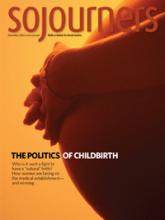Christians concerned about poverty and the environment aren't used to sitting at the popular table in the cultural cafeteria. So when Cindy Crawford waxes poetic about her "eco-awakening" in Vanity Fair and a Proctor & Gamble advertising circular shows a smiling woman icing a cake beside the words "Do more with less" -- well, we can be forgiven for not knowing whether to applaud or grimace. Beg your pardon if we ask questions about the monetizing of our values, or if we doubt that Zac Efron's use of an "eco-limo" has anything to do with what we've been talking about all these years.
By now, many Christians are accustomed to being branded "green" because they freeze corn or bike to work. The corporate hijacking of the environmental movement is old news, writes Lauren Weber, author of In Cheap We Trust: The Story of a Misunderstood American Virtue. What is new, Weber claims, is the extent to which "cheap is the new green." Stories about the new frugality have hit most major news outlets, and what Weber calls the "eco-cheap" economy -- the world of secondhand commerce, bartering, and freeganism -- is drumming up increasing attention.
Read the Full Article
